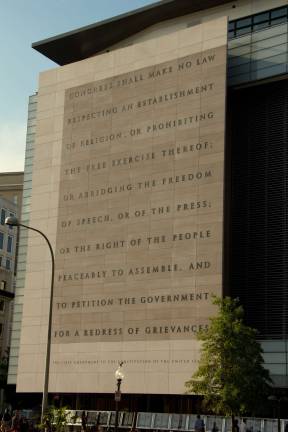Journalists are not the enemy of the people

By Jeanne Straus
We’re concerned about President Donald Trump’s attacks on journalists. At Straus News we don’t editorialize or endorse candidates for local or national elections because we want our news coverage to be as accurate and balanced as possible. Given that our staffs are small, we don’t want the person writing the news story to write an opinion piece on the same topic.
Even though we’re covering local issues — and not the president — we take personally his attacks on our work.
We aim to keep watch on government appointees, elected officials, school administrators — people in power in our community. We’re not liars and we’re not “the enemy.”
We’re the people whose job it is to be curious and skeptical and ask a lot of questions.
There is an important difference between opinion journalism — talking heads on TV, editorial pages — and what’s on the front page of, say, The Wall Street Journal. You may or may not agree with what The Wall Street Journal or The Washington Post espouse on their editorial pages but their news pages report the facts, as truthfully and accurately as possible.
The president does the country a great disservice by lumping together opinion journalism and news reporting — and attacking the work we do every day. Calling NBC News the “enemy of the American people” is reprehensible.
Tensions between newspapers and presidents are not new. All presidents come to hate news coverage. Thomas Jefferson wrote his famous line about how important a free press was: “And were it left to me to decide whether we should have a government without newspapers, or newspapers without a government, I should not hesitate a moment to prefer the latter” early in his career when he was ambassador to France.
Later, newspapers took a critical stance and Jefferson took a critical tone with them.
Early in his presidency, President Bill Clinton reportedly complained to Arthur Ochs Sulzberger, then the publisher of The New York Times, about the paper’s editorials. Sulzberger told the president he considered the editorials “tough love.”
“Well, just don’t forget the love part,” the president was said to have replied.
A decade later, President George W. Bush summoned New York Times top personnel to the Oval Office to try to prevent the paper from publishing an article about the National Security Agency’s monitoring of phone calls without court-approved warrants.
Closer to home, New York City Mayor Bill de Blasio had the police remove a New York Post reporter for asking a question.
The president seems to want to weaken the institution that’s supposed to question authority. The Guardian of London wrote the following in an editorial, after The Capital Gazette’s offices in Maryland were attacked and five people killed:
“The plain task of finding out what is true and making it comprehensible and interesting is an honorable trade. Honest journalism is a vital part of any decent society. Fearless journalism is a sign, and a part of the defenses, of any free society. The trade can be grubby and — perish the thought — self-important but it gives us a warped mirror of our flawed selves and what we all learn from it is more important than the flaws. This is particularly true of local journalism because the local papers write about their readers and not about half-mythical celebrities. They help communities to recognize themselves in their common humanity and, at their best, can help them to come together....
“The real enmity lies not between the press and the people, but the free press (and people) and the powerful.”
We don’t like being the focus of the story. Our job, as we see it, is to act as impartial observers. And since we’re committed to reporting on the local issues that most impact our readers’ lives, we try not to whine about our business challenges — newsprint tariffs and the like.
But this moment feels different. The president’s constant barrage of attacks on the press feels dangerous. A free and democratic society needs independent watchdogs questioning those in power.
In other words: honest, professional journalists reporting the facts.
Jeanne Straus is president of Straus News, publisher of this newspaper. She joins 100+ newspapers across the country publishing opinion pieces this week decrying the attacks on journalism and emphasizing the importance of a free press to our democracy.